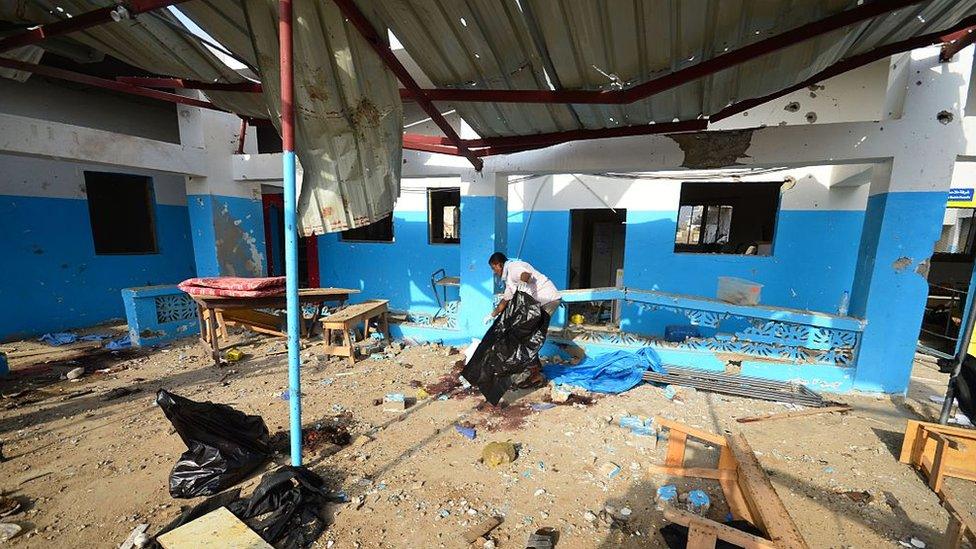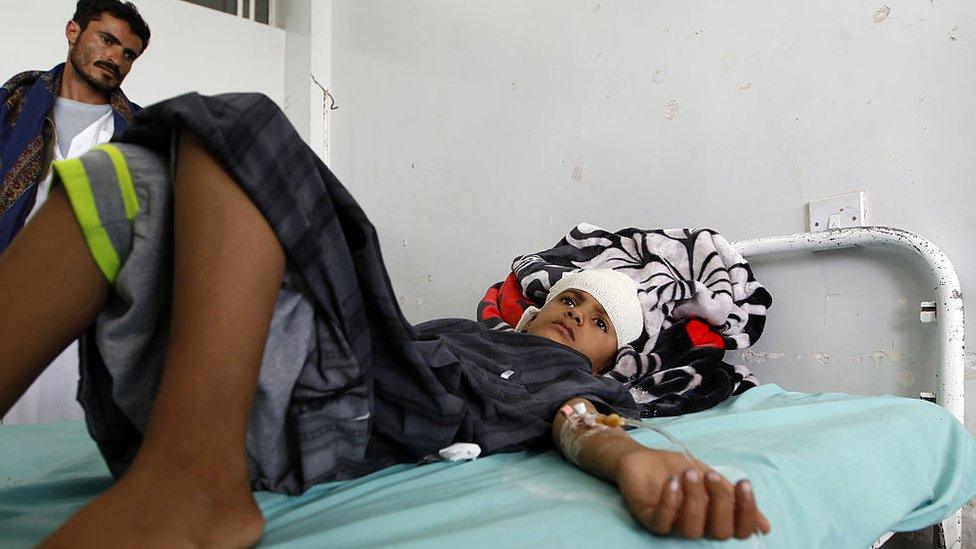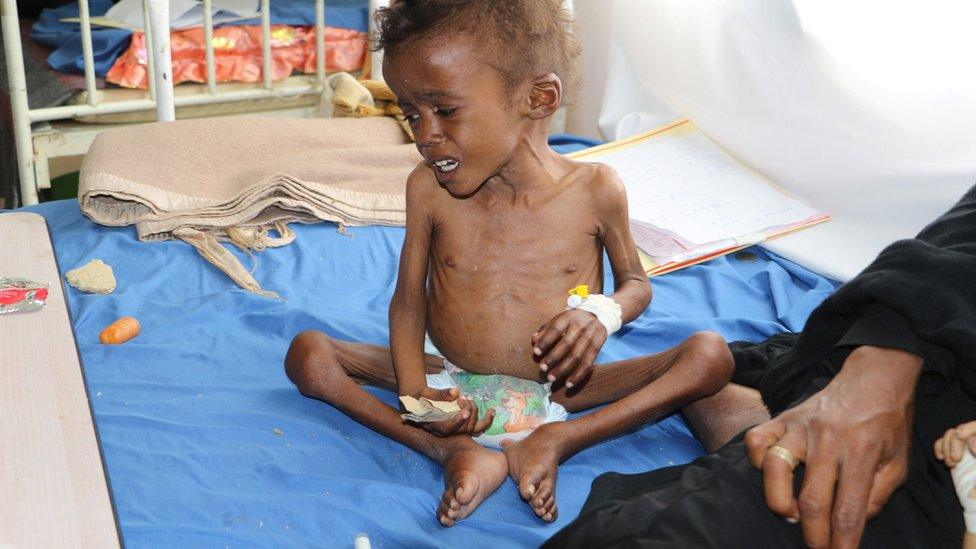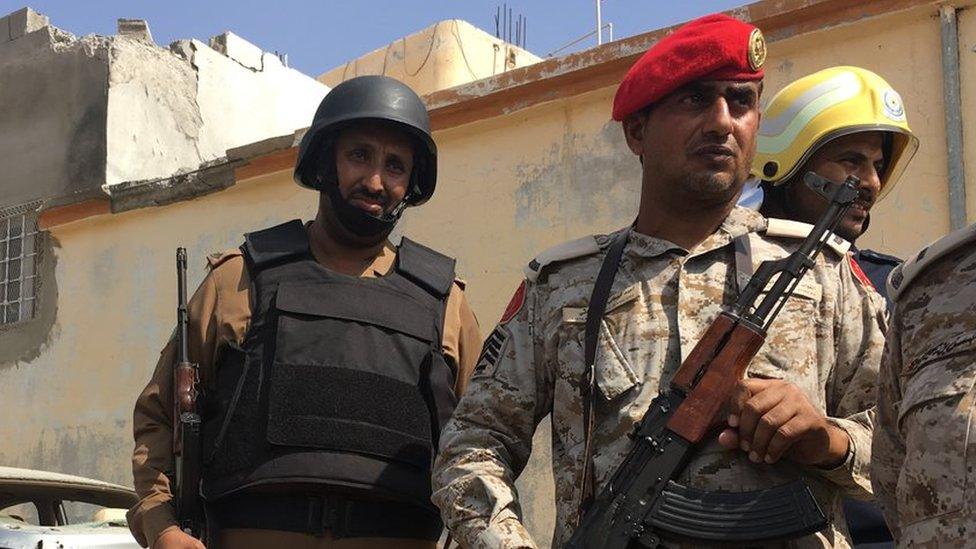Saudi 'should be blacklisted' over Yemen hospital attacks
- Published

Nineteen people died and 24 were injured when the Saudi-led coalition bombed an MSF-run hospital in Hajjah, the report says
The UN should put Saudi Arabia back on a list of violators of children's rights because of attacks on hospitals in Yemen, two rights groups say.
In a report, external, Save the Children and Watchlist detail how attacks on hospitals and doctors, and the blocking of aid, are affecting children.
Houthi rebels are criticised as well as the Saudi-led coalition.
Unicef estimates that a child dies every 10 minutes from preventable causes in the civil war-hit country.
Saudi Arabia is leading an international coalition in support of forces loyal to the internationally-recognised government of President Abdrabbuh Mansour Hadi, who are locked in a protracted battle with Houthi rebels and their allies.
The UN included Saudi Arabia on its annual list of violators of children's rights in 2016, but removed it a week later, pending a review.
Former Secretary General Ban Ki-moon said Saudi Arabia had threatened to cut funding to UN humanitarian programmes, although Saudi Arabia denied that funding was discussed or intimidation used.

Both sides have been criticised for killing and injuring civilians in the fighting
More than 160 attacks against medical facilities and personnel in Yemen have been carried out in the past two years by the warring parties, the report says, citing the International Committee of the Red Cross.
Save the Children and Watchlist catalogue examples including:
The aerial bombing by the Saudi-led coalition of Abs Hospital in Hajjah governorate in August 2016, which the report says killed 19 people and injured 24. At the time of the attack, 23 patients were undergoing surgery, 25 children including 13 newborns were in the pediatric unit, the report says. Medecins Sans Frontieres withdrew staff from six hospitals in the region in response.
A coalition airstrike on a hospital in the Haydan district of Saada in October 2015, in which there were no casualties, but the report says the operating theatre and maternity ward were damaged, and 200,000 people were left without healthcare
A coalition airstrike in September 2015, on a security building in front of Al Sabeen pediatric hospital in the capital Sanaa, which the report says "significantly damaged" the hospital. All patients and staff were evacuated, including women in labour and 20 infants in incubators - two of whom died due to lack of oxygen, it says.
An incident in 2015, in the southern city of Taiz, where armed militants stormed and occupied the Yemen International Hospital, which the report said forced out 80 patients, including 20 from intensive care.
A Saudi-led coalition bombing of a centre for care of the blind in Sanaa City in January 2016, which took place, according to the report, after the Houthis had placed military personnel inside the same complex.
Saudi Arabia says it has procedures to avoid striking civilian sites such as hospitals and refugees camps, and says the Houthis exaggerate numbers of deaths and allow their fighters to mingle with civilians. But coalition officers also admit some sites have been hit in error.

Yemen is also on the brink of famine and hospitals are battling to treat malnourished children
The report also details how the conflict has left the health system in crisis, with just 45% of medical facilities functioning.
The country is also on the brink of famine, with nearly 50% of children under five chronically malnourished.
The two organisations say a de facto naval blockade imposed by the Saudi-led coalition has "significantly restricted" imports of food, medicines and fuel.
Save the Children says the coalition prevented entry through the port of Hudaydah of its shipments to treat thousands of children suffering from diarrhoea, measles, malaria and malnutrition, in early 2017.
Meanwhile, Houthi rebels have, "with limited exception", prevented humanitarian agencies from delivering lifesaving medical supplies into Taiz, the report says.
Power cuts have forced hospitals to rely on generators, with one case listed where a baby in an incubator died because the hospital lost power for an hour.
Landmine deaths
Separately, Human Rights Watch called on Houthi forces and their allies to stop using landmines, external, which are indiscriminate and internationally banned.
It said they had used landmines in six governorates since March 2015, causing numerous civilian casualties and hindering the safe return of displaced civilians.
Citing figures from local groups, it said 18 people had been killed by landmines in Taiz governorate and more than 80 in Marib and al-Jawf governorates since the conflict began.
The International Campaign to Ban Landmines reported that at least 988 people were killed or wounded by landmines or other explosive remnants of war in Yemen in 2015.
- Published9 December 2016
